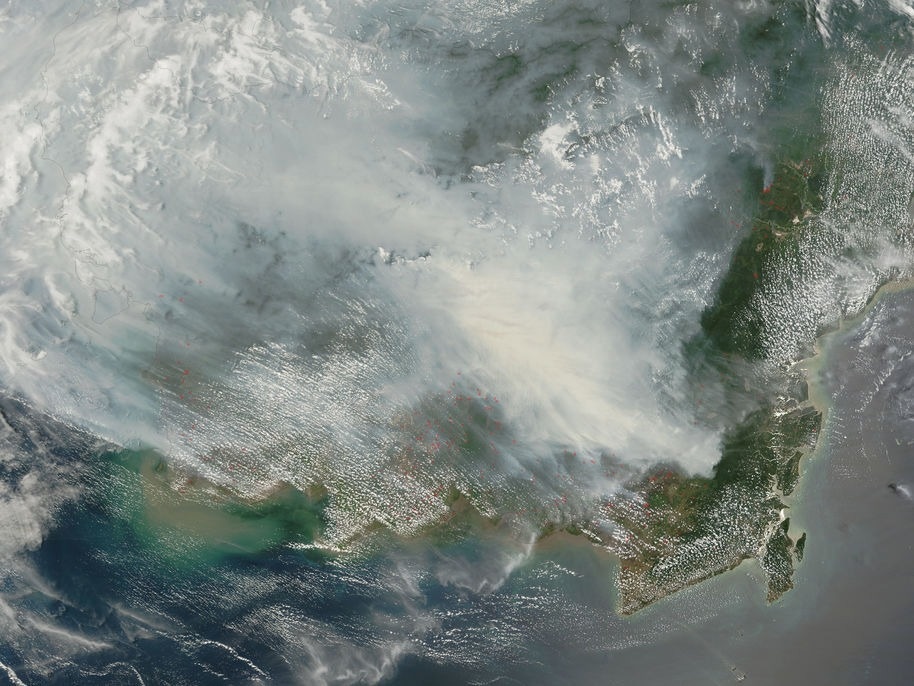Sep 12 2022Reviewed by Mila Perera
In a world formed by climate change, wildfires are a rising threat. Scientists from Aalto University have now designed a neural network model that can precisely forecast fire occurrences in peatlands. They employed the new model to test the effect of various strategies for controlling fire risk and found a collection of interventions that would decrease fire incidence by 50-76%.

Satellite image of Borneo in 2006 covered by smoke from fires (marked by red dots). Image Credit: Jeff Schmaltz, MODIS Rapid Response Team / NASA.
The research concentrated on the Central Kalimantan province of Borneo in Indonesia, which has the maximum density of peatland fires in Southeast Asia due to its vulnerability resulting from drainage for residential expansion or agriculture.
Alongside threatening lives and livelihoods, peatland fires expel considerable quantities of CO2. Nevertheless, strategies for prevention have incurred challenges due to the deficiency of clear, measured links between projected interventions and fire risk.
To forecast the peatland fire distribution, the new model employs measurements carried out before each fire season from 2002 to 2019. Although the outcomes can be widely applied to peatlands elsewhere, a new strategy would have to be used for other contexts.
Our methodology could be used for other contexts, but this specific model would have to be re-trained on the new data.
Alexander Horton, Study Lead Author and Postdoctoral Researcher, Aalto University
The scientists deployed a convolutional neural network to examine 31 variables, such as the land cover type and pre-fire indices of drought and vegetation. After training, the network forecasted the probability of a peatland fire at every spot on the map, producing a predicted distribution of fires for the year.
Overall, 80–95% of the neural network predictions were precise. Nevertheless, even though the model was generally accurate in forecasting a fire, it missed several real-world fires.
Around 50% of the fires that occurred were not forecasted by the model, which means that it is not ideal as an early-warning predictive system. Greater groupings of fires are well-forecasted, whereas the network usually missed isolated fires. With more research, scientists hope to advance the network's performance to function as an early-warning system.
Researchers took advantage of the fact that fire predictions were typically accurate to verify the effect of different land management models. They discovered that the most efficient plausible strategy would be to transform scrubland and shrubland into swamp forests by simulating various interventions to decrease fire incidence by 50%.
Fires would be reduced by 70% overall if this strategy were combined with blocking all minor drainage canals. Such a strategy, however, would have obvious economic disadvantages.
The local community is in desperate need of long-term, stable cultivation to booster the local economy.
Alexander Horton, Study Lead Author and Postdoctoral Researcher, Aalto University
Establishing more plantations would be a substitute strategy, as good management will drastically decrease the fire probability. However, plantations result in catastrophic deforestation.
The plantations are mostly owned by larger corporations, often based outside Borneo, which means the profits aren't directly fed back into the local economy beyond the provision of labor for the local workforce.
Alexander Horton, Study Lead Author and Postdoctoral Researcher, Aalto University
Ultimately fire prevention strategies must manage risks, benefits, and expenses, and this study provides the data to do that, states Professor Matti Kummu, who headed the research team.
“We tried to quantify how the different strategies would work. It’s more about informing policy-makers than providing direct solutions,” concludes Matti.
Source: https://www.aalto.fi/en